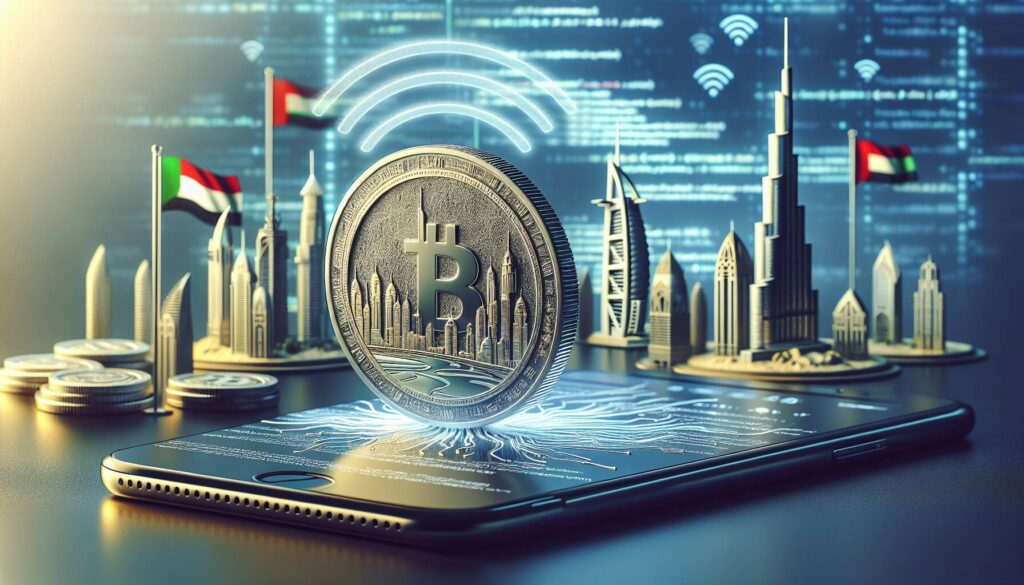In a groundbreaking move that underscores its ambition to foster a cashless environment, Dubai has made headlines by agreeing to accept cryptocurrency payments for government services through a collaboration with the well-known crypto exchange, Crypto.com. This strategic partnership is a significant milestone in Dubai’s ongoing journey toward becoming a leading center for cryptocurrency in the Middle East.
As per the recent announcement, once the technical groundwork is laid, both individuals and businesses will be able to use Crypto.com’s digital wallets to pay various government fees. The deal, sanctioned by the emirate’s Virtual Assets Regulatory Authority (VARA), ensures that these payments will be seamlessly converted into dirhams, facilitating a smooth transaction process for users.
“This agreement allows the government to harness financial technology in launching a new digital payment channel on the government’s digital portals,” the release stated, highlighting the broader implications for the emirate’s economic landscape.
The cashless initiative is projected to inject at least 8 billion dirhams (approximately $2.2 billion) annually into Dubai’s economy, reflecting the government’s commitment to leveraging financial technology to enhance economic growth. Over the years, Dubai has been steadily building its reputation as a crypto powerhouse, having established VARA in March 2022 as the world’s first independent regulator of virtual assets. This was a pivotal moment, enabling the issuance of licenses to influential exchanges like Binance and OKX, which further consolidates Dubai’s position in the crypto market.
Moreover, the emirate is not just resting on its laurels; it has also embarked on an ambitious metaverse strategy, seeking to attract 1,000 metaverse and blockchain companies by 2030. This forward-thinking approach is aimed at ensuring that Dubai remains not only relevant but also a frontrunner in the rapidly evolving digital economy.

Dubai Embraces Cryptocurrency for Government Payments
Dubai’s recent agreement to allow cryptocurrency payments through Crypto.com signifies a monumental shift towards a cashless society, potentially impacting residents and businesses in several ways.
- Government Services Payment
- Individuals and businesses can utilize digital wallets from Crypto.com to pay government fees.
- This transition simplifies payment processes, making transactions more efficient.
- Conversion to Local Currency
- Payments made in cryptocurrency will be converted into dirhams for processing.
- This mechanism ensures stability and compliance with local monetary regulations.
- Impact on the Economy
- The cashless strategy is projected to contribute an additional 8 billion dirhams ($2.2 billion) to the economy annually.
- This growth can enhance public services and infrastructure, benefiting all residents.
- Positioning as a Crypto Hub
- Dubai aims to establish itself as a leading center for cryptocurrency in the Middle East.
- With the creation of VARA, Dubai is taking significant steps toward regulating and fostering crypto innovation.
- Metaverse Strategy
- The government has initiated a strategy to attract 1,000 metaverse and blockchain companies by 2030.
- This ambition could create numerous job opportunities and stimulate the tech-driven economy.
Dubai’s venture into cryptocurrency is not just about technology but also about redefining the economic landscape and enhancing the quality of life for its residents.
Dubai Embraces Cryptocurrency: A Game-Changer for Digital Payments
Dubai’s recent agreement to allow cryptocurrency payments for government services marks a significant step toward its ambitious cashless society vision. Partnering with Crypto.com, this initiative opens up new avenues for tech-savvy citizens and businesses, enabling payments through digital wallets. Such a move positions Dubai as a leader in financial innovation, rivaling other global cities pioneering similar efforts.
Competitive Advantages: The collaboration with Crypto.com, a licensed player under Dubai’s Virtual Assets Regulatory Authority (VARA), ensures that transactions are secure and compliant. This partnership dramatically enhances user experience by offering seamless conversions from cryptocurrency to dirhams, boosting efficiency in payment processes. Moreover, with projections suggesting an annual economic influx of around 8 billion dirhams (approximately $2.2 billion), the initiative promises a substantial impact on the local economy, strengthening Dubai’s ambition to emerge as a crypto capital of the Middle East.
Looking at other regions, cities like Miami and Singapore have also embraced digital currencies, yet Dubai’s unique strategic approach, including an independent crypto regulatory body, adds a notable edge. While Singapore and Miami are focused on tech adoption and fostering startups, Dubai is combining advanced regulatory frameworks with strategic economic goals, setting a different precedent in the realm of government-funded innovation.
Competitive Disadvantages: However, the transition to cryptocurrency for government services is not without its risks. The volatility inherent in cryptocurrency markets can create unpredictability for both users and the government. Consumers may face fluctuating payment amounts which complicate budgeting for services. Additionally, cybersecurity threats pose a significant challenge; as digital payment systems expand, so does the target for cybercriminals, potentially undermining consumer trust.
This agreement could significantly benefit tech-savvy individuals and businesses eager to engage with cryptocurrencies. Entrepreneurs and startups within the tech and financial realms stand to gain immensely through increased customer engagement and larger transaction volumes. However, traditional businesses and individuals less familiar with digital currencies may find the transition challenging, potentially alienating a segment of the population that still feels cautious about cryptocurrency.
As Dubai continues its journey toward becoming a cashless society, the implications of this partnership will be closely monitored by other nations and cities eager to emulate its success or learn from its challenges. The dynamic landscape of cryptocurrency in government services is evolving rapidly, and Dubai’s proactive stance may either inspire other jurisdictions or serve as a cautionary tale, depending on its outcomes.















